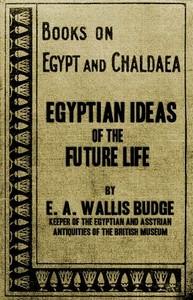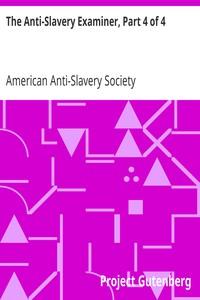|
|
Read this ebook for free! No credit card needed, absolutely nothing to pay.Words: 50894 in 9 pages
This is an ebook sharing website. You can read the uploaded ebooks for free here. No credit cards needed, nothing to pay. If you want to own a digital copy of the ebook, or want to read offline with your favorite ebook-reader, then you can choose to buy and download the ebook.

: Egyptian Ideas of the Future Life by Budge E A Wallis Ernest Alfred Wallis Sir - Egypt Religion; Future life; Eschatology Egyptian Egypt@FreeBooksTue 06 Jun, 2023 CHAPTER CHAPTER FROM THE PAPYRUS OF NEBSENI FROM THE PAPYRUS OF ANI FROM THE PAPYRUS OF ANILAI THE BELIEF IN GOD ALMIGHTY. A study of ancient Egyptian religious texts will convince the reader that the Egyptians believed in One God, who was self-existent, immortal, invisible, eternal, omniscient, almighty, and inscrutable; the maker of the heavens, earth, and underworld; the creator of the sky and the sea, men and women, animals and birds, fish and creeping things, trees and plants, and the incorporeal beings who were the messengers that fulfilled his wish and word. It is necessary to place this definition of the first part of the belief of the Egyptian at the beginning of the first chapter of this brief account of the principal religious ideas which he held, for the whole of his theology and religion was based upon it; and it is also necessary to add that, however far back we follow his literature, we never seem to approach a time when he was without this remarkable belief. It is true that he also developed polytheistic ideas and beliefs, and that he cultivated them at certain periods of his history with diligence, and to such a degree that the nations around, and even the stranger in his country, were misled by his actions, and described him as a polytheistic idolater. But notwithstanding all such departures from observances, the keeping of which befitted those who believed in God and his unity, this sublime idea was never lost sight of; on the contrary, it is reproduced in the religious literature of all periods. Whence came this remarkable characteristic of the Egyptian religion no man can say, and there is no evidence whatsoever to guide us in formulating the theory that it was brought into Egypt by immigrants from the East, as some have said, or that it was a natural product of the indigenous peoples who formed the population of the valley of the Nile some ten thousand years ago, according to the opinion of others. All that is known is that it existed there at a period so remote that it is useless to attempt to measure by years the interval of time which has elapsed since it grew up and established itself in the minds of men, and that it is exceedingly doubtful if we shall ever have any very definite knowledge on this interesting point. Here it will be objected by those who declare that the ancient Egyptian idea of God is on a level with that evolved by peoples and tribes who stand comparatively little removed from very intelligent animals, that such high conceptions as self-existence and immortality belong to a people who are already on a high grade of development and civilization. This is precisely the case with the Egyptians when we first know them. As a matter of fact, we know nothing of their ideas of God before they developed sufficiently to build the monuments which we know they built, and before they possessed the religion, and civilization, and complex social system which their writings have revealed to us. In the remotest prehistoric times it is probable that their views about God and the future life were little better than those of the savage tribes, now living, with whom some have compared them. The primitive god was an essential feature of the family, and the fortunes of the god varied with the fortunes of the family; the god of the city in which a man lived was regarded as the ruler of the city, and the people of that city no more thought of neglecting to provide him with what they considered to be due to his rank and position than they thought of neglecting to supply their own wants. In fact the god of the city became the centre of the social fabric of that city, and every inhabitant thereof inherited automatically certain duties, the neglect of which brought stated pains and penalties upon him. The remarkable peculiarity of the Egyptian religion is that the primitive idea of the god of the city is always cropping up in it, and that is the reason why we find semi-savage ideas of God side by side with some of the most sublime conceptions, and it of course underlies all the legends of the gods wherein they possess all the attributes of men and women. The Egyptian in his semi-savage state was neither better nor worse than any other man in the same stage of civilization, but he stands easily first among the nations in his capacity for development, and in his ability for evolving conceptions concerning God and the future life, which are claimed as the peculiar product of the cultured nations of our time. Passing from religious texts to works containing moral precepts, we find much light thrown upon the idea of God by the writings of the early sages of Egypt. First and foremost among these are the "Precepts of Kaqemna" and the "Precepts of Ptah-hetep," works which were composed as far back as B.C. 3000. The oldest copy of them which we possess is, unfortunately, not older than B.C. 2500, but this fact in no way affects our argument. These "precepts" are intended to form a work of direction and guidance for a young man in the performance of his duty towards the society in which he lived and towards his God. It is only fair to say that the reader will look in vain in them for the advice which is found in writings of a similar character composed at a later period; but as a work intended to demonstrate the "whole duty of man" to the youth of the time when the Great Pyramid was still a new building, these "precepts" are very remarkable. The idea of God held by Ptah-hetep is illustrated by the following passages:-- The epithets which the Egyptians applied to their gods also bear valuable testimony concerning the ideas which they held about God. We have already said that the "gods" are only forms, manifestations, and phases of R, the Sun-god, who was himself the type and symbol of God, and it is evident from the nature of these epithets that they were only applied to the "gods" because they represented some qualify or attribute which they would have applied to God had it been their custom to address Him. Let us take as examples the epithets which are applied to Hpi the god of the Nile. The beautiful hymn to this god opens as follows:-- "Homage to thee, O Hpi! Thou comest forth in this land, and dost come in peace to make Egypt to live, O thou hidden one, thou guide of the darkness whensoever it is thy pleasure to be its guide. Thou waterest the fields which R hath created, thou makest all animals to live, thou makest the land to drink without ceasing; thou descendest the path of heaven, thou art the friend of meat and drink, thou art the giver of the grain, and thou makest every place of work to flourish, O Ptah! ... If thou wert to be overcome in heaven the gods would fall down headlong, and mankind would perish. Thou makest the whole earth to be opened by the cattle, and prince and peasant lie down to rest.... His disposition is that of Khnemu; when he shineth upon the earth there is rejoicing, for all people are glad, the mighty man receiveth his meat, and every tooth hath food to consume." After praising him for what he does for mankind and beasts, and for making the herb to grow for the use of all men, the text says:-- "He cannot be figured in stone; he is not to be seen in the sculptured images upon which men place the united crowns of the South and the North furnished with uraei; neither works nor offerings can be made to him; and he cannot be made to come forth from his secret place. The place where he liveth is unknown; he is not to be found in inscribed shrines; there existeth no habitation which can contain him; and thou canst not conceive his form in thy heart." "God is One and alone, and none other existeth with Him; God is the One, the One Who hath made all things. Free books android app tbrJar TBR JAR Read Free books online gutenberg More posts by @FreeBooks
: The Anti-Slavery Examiner Omnibus by American Anti Slavery Society - Antislavery movements United States Periodicals; Slavery United States Periodicals Slavery@FreeBooksTue 06 Jun, 2023

: The Anti-Slavery Examiner Part 4 of 4 by American Anti Slavery Society - Antislavery movements United States Periodicals; Slavery United States Periodicals Slavery@FreeBooksTue 06 Jun, 2023
|
Terms of Use Stock Market News! © gutenberg.org.in2025 All Rights reserved.






